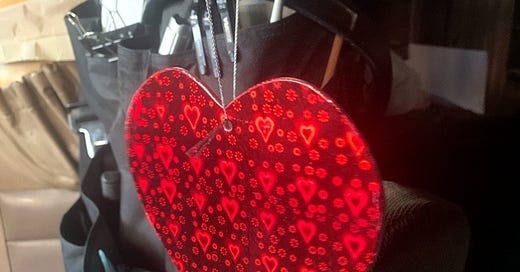Here's This Lady Running at Me (Part 2 of 3)
'Just giving me a huge bear hug. Thanking me for being in Ottawa.'
Part 1: The Biggest Flag I Could Put on There
Winnipeg trucker Clarence had never been to Ottawa before. “I had no idea what to expect,” he says. The western arm of the Freedom Convoy spent much of Saturday morning organizing itself on a small airport runway in Arnprior, less than an hour from the nation’s capital. “When we were lining up, we were the length of that runway, bumper to bumper, three wide,” he says. “Then it was a slow drive in, because we were really trying to stay together, bunched up.”
In Ottawa, he was directed down onto the Sir John A Macdonald Parkway. From the outset, he says, a lot of the truckers were “questioning what we were doing there. But people were bringing us soup and hot food. People with signs, who knew we were there.”
The next morning, he was amongst those who jumped at the chance to move downtown. Following someone else’s lead, he ended up on Slater Street for a day, in front of the Iconic Cafe. Run by an immigrant and his daughter, that restaurant – which was evicted by its landlord shortly after the protest ended - welcomed the truckers. In defiance of local health regulations, no masks or vaccine passports were required. Clarence remembers being pleasantly surprised. “To just go in and find that they were totally on our side. They had Canada flags flying in there, it was an incredible place to be.”
Clarence grew up traditional Mennonite, with women sitting on one side of the church, and men on the other. The church he and his family currently attend “isn’t really Mennonite,” he says. In Ottawa, “I was shocked at the amount of German background, Mennonite background. Almost every truck on my block was Mennonite origins.”
During the final days of the protest, he remembers, “I was parked right in front of the House of Commons. My truck was all over the news for a few days. They were showing my truck being directed by the police as we were moving up to Wellington.”
Throughout the entire adventure, he says there was never any shortage of public support. Back home, someone with whom his company does business reimbursed his out-of-pocket expenses. Others in his community, including police officers, “wanted to contribute, but they didn’t want to be too obvious about it. When I left home, I didn’t care if I paid for every dollar of fuel, I was going.” By the end, contributions from people who stopped by his truck in downtown Ottawa added up to “a couple grand in my pocket.” He remembers a young woman whom he thinks was in her late teens,
She come up to my truck, and asked if I was gonna stay here until it’s over. She asked a couple of times. It’s like, How do I answer this, what am I really saying? I told her, ‘Yes, I'm staying till it's over.’ As soon as I said that, she reaches in her jacket and pulls out a hundred dollar bill. A young girl. Handing out $100 bills. I don’t think I was the only truck she did that to.
Early on, a young nurse who’d lost her job due to vaccine mandates brought Clarence a shiny cardboard heart on a string, and gave him her contact info. She’d “come downtown with her car and pick me and another driver up,” he remembers. They’d grab a shower at her place, and she’d “do our laundry and serve us fresh homemade food.”
Then there was the encounter with a random stranger, the day he pointed his truck in the direction of home. “I was cruising down one of those small Ontario roads,” he remembers. “All of a sudden, there’s a car behind me flashing lights, flashing lights. Why is this guy flashing his lights? So I finally stopped, pulled over. I got out of the truck and here’s this lady running at me, and just giving me a huge bear hug. Thanking me for being in Ottawa. The biggest hug.”
Clarence was also befriended by Katia, who arrived in Canada as a small child with her immigrant parents. That part of the story is told here: Such a High.
next instalment: We Came Peaceful, We’re Leaving Peaceful





